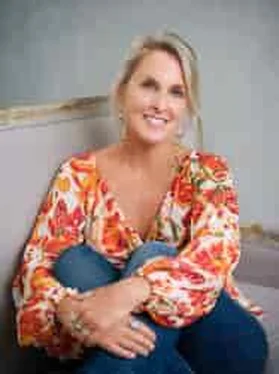She loved the stormy days when the waves pummeled the shore and the screen door rattled in its frame. Uncle Bo would light a fire and Aunt Greta would make lobster stew. They played Parcheesi and read their books and listened to the classical station out of Boston on the transistor radio.
There is still one photograph in the cottage of Aunt Greta and Uncle Bo together, and Mallory had studied it when she’d first moved in. It’s a picture of them on the beach in their woven plastic chairs, their hair wet and their feet sandy. After looking at it a few seconds, Mallory realized it was a picture she herself had taken with her uncle’s camera. Aunt Greta was wearing a red floral one-piece bathing suit with a tissue tucked into her bosom so her chest wouldn’t burn. Her dark hair, cut short like a man’s, was standing on end. She was beaming—and one could sense in her expression the carefree exuberance of summer. Uncle Bo was wearing sunglasses and had a copy of James Michener’s Chesapeake opened across his hairy chest.
They look happy in that picture, Mallory thought. And yet, if she wasn’t mistaken, this was taken the summer before Uncle Bo died, so a scant year before Aunt Greta got together with Ruthie and thereby fractured her relations with Mallory’s family.
Mallory has of course wondered if her aunt was a lesbian all along and if her uncle was, perhaps, gay. Maybe theirs was a marriage of convenience or a marriage of deep, intense friendship, a meeting of minds if not bodies.
Mallory doesn’t care. She misses her aunt and uncle, but she suspects some spiritual shreds of them remain here, because although Mallory was often lonely in New York, she has not felt lonely in Nantucket even once.
Mallory works Tuesdays, Wednesdays, and Thursdays as a lunch waitress at the Summer House pool. Her favorite coworker is a young African-American woman named Apple who also happens to be the guidance counselor at Nantucket High School. Mallory asks Apple if there are any openings at the high school for teachers or even substitute teachers.
“I majored in English,” Mallory says.
“You might get lucky,” Apple says. “Mr. Falco currently teaches honors and AP English but he just turned seventy and he’s deaf in one ear, so we’re thinking maybe he’ll retire? In which case, in September, I’ll put your résumé right in front of Dr. Major, our principal. We could use some new blood.”
Mallory is grateful, though she doesn’t want to wish her summer away. The Summer House pool has jaw-dropping views of Sconset Beach and the Atlantic Ocean. Guests can enjoy lunch on the chaises or sit at one of the patio tables under an umbrella. The food isn’t bad—Mallory steers people toward the burgers, the grilled chicken sandwiches, the salads topped with crab cakes—but most of Mallory’s business is drinks. The bar’s specialty is something called the Hokey Pokey, which has four kinds of liquor in it; the drink costs ten dollars and most people have two or more of them. Mallory makes nearly two hundred dollars a day in tips. She works with either Apple or a girl named Isolde, who is kind of a bitch but who knows her stuff. The bartender’s name is Oliver. He’s cute and has an Australian accent, making him a key contributor to the Summer House pool’s success. Oliver brings in the young ladies (“Ollie’s dollies,” Isolde calls them). And the crowd of young ladies at the bar lures in the men with money.
It’s the best job Mallory has ever had. Working three days a week is enough because she has the nest egg from Aunt Greta tucked away in the bank. With a part-time job, Mallory still has time to read, to swim and sun, to explore the island on her bike, to go out with Apple after their shifts.
Every night before Mallory falls asleep, she silently thanks her aunt Greta. What a gift. What an opportunity.
Everybody hurts; she knows this. But not Mallory this summer.
The last Friday in August, the phone rings late at night. Mallory lets the answering machine pick up—but when she hears Leland’s voice, she stumbles out of bed. She has barely talked to her friend all summer. Mallory sent her one letter early on describing her cottage, her new job, and her ongoing flirtation with Oliver the bartender. (This ended in an ill-advised one-night stand that Mallory’s mind now swerves around as though it’s emotional roadkill.) In response, Mallory received a long and descriptive letter about summer in the city—an Indigo Girls concert in Central Park; a work lunch at the Cupping Room in SoHo, where Leland was seated at a table next to Matt Dillon; the bounty at the Greenmarket in Union Square. Leland’s writing was so lush and powerful that Mallory saved the letter in case Leland became famous and the Smithsonian came calling.
Mallory snatches up the phone in the dark. “Hello? Leland?”
“Mal.” Hearing just this one syllable, Mallory can tell that Leland is drunk. Martinis at Chumley’s, perhaps, or maybe she joined the throngs at Isabella’s, where Jerry Seinfeld was known to hang out. God, Mallory doesn’t miss New York at all.
“Hi,” Mallory says. “It’s late, you know. Everything okay?” There’s a part of Mallory that fears she will one day get a phone call that takes away her new life as swiftly as it was granted.
“So, listen…,” Leland says. Listen comes out as “lishen.” “I called and booked my flights. I land Friday at eight p.m. and I’m sorry but I have to leave Sunday instead of Monday because my friend Harrison is having this rooftop thing—”
“Wait, wait,” Mallory says. Her thoughts feel like a tangled skein of yarn. “Which Friday are we talking about?”
“Next Friday,” Leland says. “Labor Day weekend. Like we planned.”
Planned is an overstatement. What Mallory knows for sure is that when she and Leland hugged goodbye, Leland had said, “I hope to come visit you. Maybe Labor Day weekend?” To which Mallory said, “You’re welcome anytime, Lee. Obviously. You’re my best friend.”
And then in the letter, Leland had closed with Labor Day is still on my radar!
Certainly it has been on Mallory’s radar too, though it feels like Leland missed an intermediary step, the step where she called to make sure Labor Day weekend still worked for Mallory, at which point Mallory had intended to tell her that Cooper, Frazier Dooley, and Jake McCloud were coming for Cooper’s bachelor-party weekend and Leland should pick a different weekend. But that step was skipped too, which is a little irritating. They are no longer the little girls who ran indiscriminately between each other’s houses; they’re grown-ups.
Leland has bought plane tickets. She lands Friday at eight.
“I have something to tell you,” Mallory says. She isn’t sure how her news will be received. “Labor Day weekend, when you’re here…”
“Yeah?” Leland says.
“Cooper will also be here!” Mallory adds a handful of verbal confetti to the announcement to make it sound like a wonderful surprise: “I haven’t had a chance to write to you about this, but he’s getting married at Christmas to a waitress named Krystel.” Mallory pauses to let this sink in before she zaps Leland with the rest of it.
“I know,” Leland says. “My mother told me.”
“She did?” Mallory says, then she thinks, Of course she did. Kitty and Leland’s mother, Geri Gladstone, are best friends and play tennis together every single day from May through September at the country club. “Okay, good—so Coop asked if I could host a little bachelor weekend here over Labor Day and since I wasn’t a hundred percent sure you were coming, I said okay.”
“Bachelor weekend?” Leland says. “Does that mean what I think it means?”
Читать дальше












